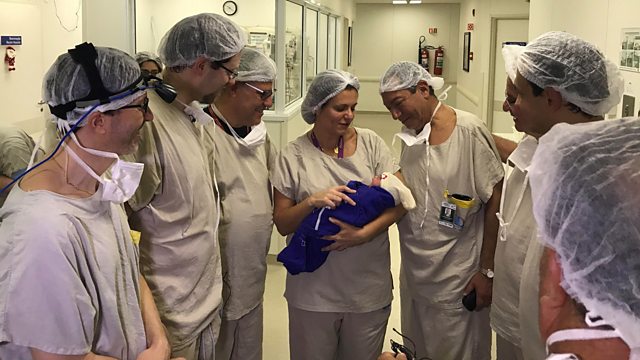World’s First Baby Born After Deceased Womb Transplant
Babies kicking & body mapping in brain; The Kenyan snake-farm helping to transform response to snakebite; Secret ways African women are empowering themselves with family planning
A 32 year old woman, who was born without a womb, has given birth to a healthy baby girl following a womb transplant from a dead woman. The 10-hour transplant operation, and later fertility treatment, took place in São Paulo, Brazil, in 2016. Previously there have been 39 womb transplants using a live donor, including mothers donating their womb to their daughter, resulting in 11 babies. But the 10 previous transplants from a dead donor have failed or resulted in miscarriage. The ����ý’s James Gallagher reports.
New research suggests that a baby kicking in the womb may not just be due to the foetus stretching or getting comfortable, but could also be helping its brain get a map of where its body is in space. Although we do not think about it consciously, we all need to know where our arms or legs are in order to grasp objects or make sure we do not walk into things. Dr Lorenzo Fabrizi is an MRC Senior Research Fellow at University College London, and has been monitoring the brainwaves of premature and newborn babies when they kick during active sleep. The results have just been published in the journal Scientific Reports.
Each year, some 5.4 million people are bitten by snakes, and around half of them are venomous according to the World Health Organisation, who acknowledge that this could be a vast underestimate because of a lack of data for a condition that mainly affects poor people in rural areas. But in sub-Saharan Africa, a lack of anti-venom means that only 2.5 per cent of snakebite victims are getting effective treatment, or even seeking it. Without the anti-venom a snake bite can be fatal or lead to amputations, leaving people disabled and sometimes financially destitute. A small snake farm in a tourist town in Kenya’s Kilifi Country, where visitors can learn about snakes and handle the harmless ones, has been changing people's fortunes. In the past 14 years it has saved every snakebite victim who has come in, called their hotline or arrived a local clinic and they are hoping that the same model could save lives across the country and the continent. Hannah McNeish reports from Watamu.
In places where there is an imbalance of power between men and women, women can find they have few choices over family planning, and are often pressured into having more children or to start childbearing as soon as they are married. But new research conducted using in-depth interviews and focus groups with women and men in Uganda, Ethiopia and Nigeria has found that women are finding their own ways of empowering themselves and commonly resorting to covert use of contraception to have full control over their reproductive lives. The study was led by researchers at the Johns Hopkins Bloomberg School of Public Health. Lead investigator in Uganda, Simon Peter Kibira from Makerere University School of Public Health, tells Health Check what the key findings were.
(Photo caption: Medical team hold the first baby born via uterus transplant from a deceased donor at the hospital in Sao Paulo, Brazil – credit: Reuters)
Health Check was presented by Claudia Hammond with comments from ����ý Health and Science correspondent, James Gallagher.
Last on
Clip
-
![]()
Why do babies kick in the womb?
Duration: 03:13
Broadcasts
- Wed 5 Dec 2018 20:32GMT����ý World Service Online, Americas and the Caribbean, UK DAB/Freeview, Europe and the Middle East & News Internet only
- Wed 5 Dec 2018 21:32GMT����ý World Service Australasia & East Asia only
- Thu 6 Dec 2018 05:32GMT����ý World Service Online, UK DAB/Freeview, News Internet & Europe and the Middle East only
- Thu 6 Dec 2018 06:32GMT����ý World Service Australasia, Americas and the Caribbean & South Asia only
- Thu 6 Dec 2018 07:32GMT����ý World Service East and Southern Africa & East Asia only
- Thu 6 Dec 2018 11:32GMT����ý World Service West and Central Africa
- Thu 6 Dec 2018 14:32GMT����ý World Service Australasia
- Thu 6 Dec 2018 18:32GMT����ý World Service East and Southern Africa, South Asia & West and Central Africa only
- Mon 10 Dec 2018 02:32GMT����ý World Service
Podcast
-
![]()
Health Check
Health issues and medical breakthroughs from around the world.



